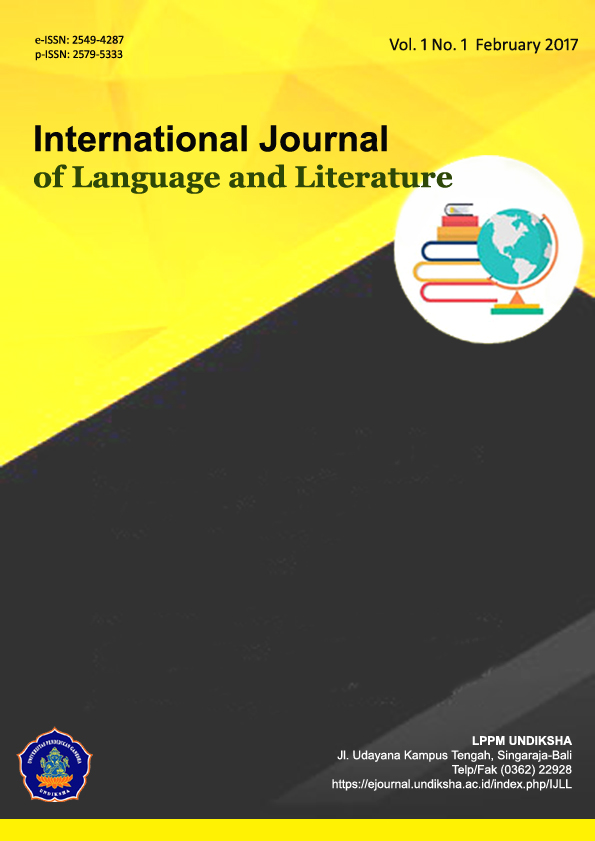MULTIMODAL COMMUNICATION ANALYSIS: THE HIGHER-LEVEL ACTIONS OF WAITERS AND WAITRESSES AT THREE RESTAURANTS IN TABANAN
DOI:
https://doi.org/10.23887/ijll.v4i4.32097Kata Kunci:
multimodal communication, verbal communication, nonverbal communication, higher-level actionsAbstrak
This study aimed to analyze the multimodal communication of waiters and waitresses at three restaurants in Tabanan, Bali Province, in applying higher-level actions in serving foreign guests and investigating the functions of the higher-level actions of waiters and waitresses in serving the foreign guests. This study used theories proposed by Fishman (1972) cited in Suandi & Indriani (2016) on functions of using verbal and nonverbal communication, Krees and Van Leewuen 2006) on multimodal communication, and Norris (2004) on higher-level actions. The subjects of this study were four waiters and two waitresses who were working at three different restaurants in Tabanan regency. The results of this study showed that in each conversation, there were many sequences of higher-level actions used by waiters or waitresses to serve the foreign guests. The waiters and waitresses used a sequence of modes alternately or simultaneously in their higher-level actions, depending on the situation. The functions of waiters or waitresses’ higher-level actions in serving foreign guests made their messages clearer to foreign guests, and this made the waiters or waitresses’ messages more believable to the foreign guests.Referensi
Busso, C. (2008). Multimodal Analysis of Expressive Human Communication: Speech and Gesture Interplay. August.
Dogan, Z. (2010). Florida State University Libraries Preschool Children ’ s Multimodal Meaning Making : Verbal and Nonverbal Comunication within Two Different Clasroom Settings.
Eunson, B. I. (2015). Non-Verbal Communication. June 2012.
Hermawan, B. (2012). Multimodality: Menafsir Verbal, Membaca Gambar, dan Memahami Teks. DOI: https://doi.org/10.17509/bs_jpbsp.v13i1.756
Johnstone, A. H & Selepeng, D. (2001). Alex H JOHNSTONE 1 and Ditshupo SELEPENG 2 1. 2(1), 19–29. DOI: https://doi.org/10.1039/B0RP90028A
Kartika, A. (2010). The Job Descriptions of Waiter / Waitress in Food and Beverage Department in Lor In Hotel FACULTY OF LETTERS AND FINE ARTS.
Marsakawati, N. P. E., Mujiyanto, J., Agustien, H. I. R., & Astuti, P. (2019). An Indonesian EFL learner’s use of evaluative language and gestures in a spoken persuasive presentation: A case study. Journal of Asia TEFL, 16(1), 401–410. https://doi.org/10.18823/asiatefl.2019.16.1.30.401 DOI: https://doi.org/10.18823/asiatefl.2019.16.1.30.401
Nagao & Takeuchi (1994). Akikazu Takeuchi Research Overview of Multimodal Dialogues Facial Displays as a New Modality Incorporating Facial Displays into a Speech Dialogue System. System.
Norris, S. (2013). Multimodal Communication : Overview. https://doi.org/10.1002/9781405198431.wbeal1345 DOI: https://doi.org/10.1002/9781405198431.wbeal1345
Norris, S. (2016). Concepts in multimodal discourse analysis with examples from video conferencing. 2, 141–165. https://doi.org/10.1515/yplm-2016-0007 DOI: https://doi.org/10.1515/yplm-2016-0007
Quyen, T. T. T., & Loi, N. V. (2018). Flipped model for improving students’ English speaking performance. Can Tho University Journal of Science, 54(2)(January), 90. https://doi.org/10.22144/ctu.jen.2018.012 DOI: https://doi.org/10.22144/ctu.jen.2018.012
Saville-troike, M. (n.d.). The Ethnography of Communication.
Suandi, I. N. & Indiraini, M. S. (2016). Tindak Komunikasi Verbal dan Nonverbal Bentuk Lepas Hormat dalam Bahasa Bali. 06(April), 37–58.
Unduhan
Diterbitkan
Cara Mengutip
Terbitan
Bagian
Lisensi
IJLL Journal provides immediate open access to its content on the principle that making research freely available to the public to supports a greater global exchange of knowledge.

This work is licensed under a Creative Commons Attribution-ShareAlike 4.0 International License







